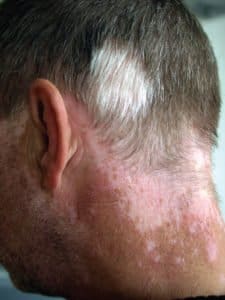
Vitiligo is an autoimmune disease in which the body’s immune system attacks the cells that produce pigment. The disease can remain localized, effecting a limited area, or may sometimes be progressive. Most currently available treatments, such as topical steroids or Excimer laser, address lesions that have already formed, but cannot prevent new areas of vitiligo from developing.
A recent study published in the British Journal of Dermatology examined the use of oral mini-pulse dexamethasone to stop vitiligo disease progression.
The 2-year study enrolled participants with active non-segmental vitiligo. One group was treated with a combination of oral mini-pulse dexamethasone (4 mg 2 consecutive days a week), narrow-band UVB three times weekly, and clobetasol cream 0.05% (for 5 consecutive days per week) while a second group was was treated with narrow-band UVB and clobetasol cream only.
The data showed that patients in the group treated with mini-pulse dexamethasone were more likely to have disease arrest as compared with the control group (92% vs 53%).
Patients in the dexamethasone-treated group exhibited side effects often seen with systemic steroid use, including insomnia (16%), weight gain >10lbs (8%), and steroid-induced acne (4%).
This study, though small ,suggests that oral mini-pulse dexamethasone may be an effective treatment to slow or stop progression of active vitiligo.
